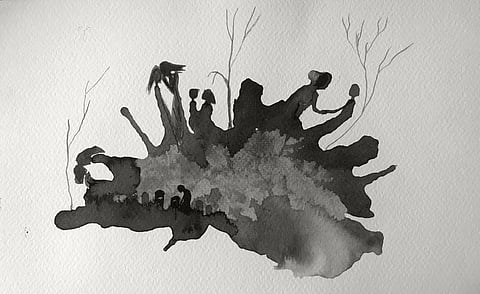Illustration: Arati Kumar-Rao
Hori. No, it's Henry. His great-grandmother had named him after a 'distant' relative she 'allegedly' had an affair with.
She had told her daughter-in-law, Henry's grandmother, on a slow, hazy night sitting by the window of their two-storey, five-room hovel next to the pond. The local boys were smoking their charas right below the window, sitting on their haunches by the water, puffing and passing. The smoke drifted up, mixed with the smell of putrefying water hyacinths and fried fish.

